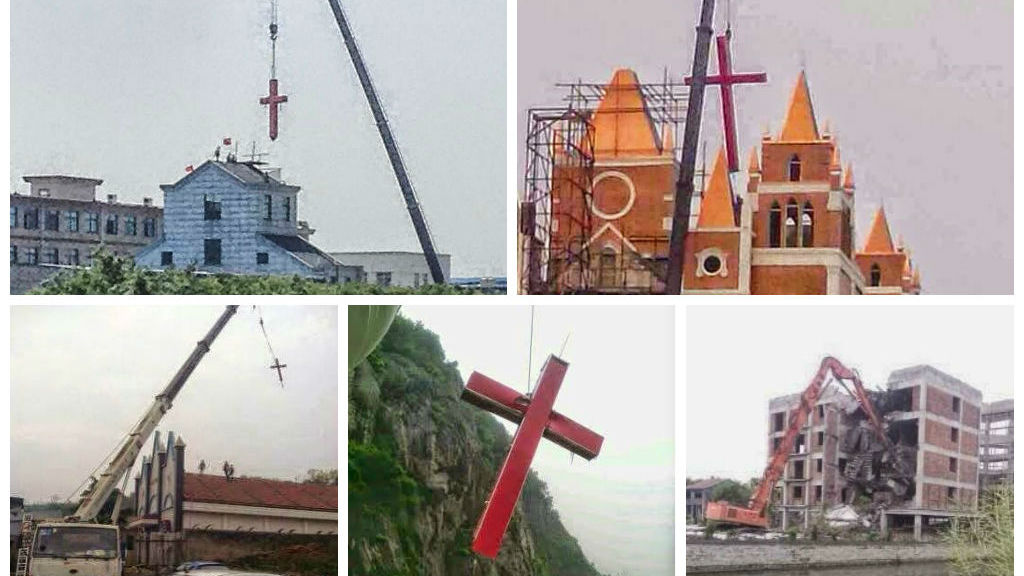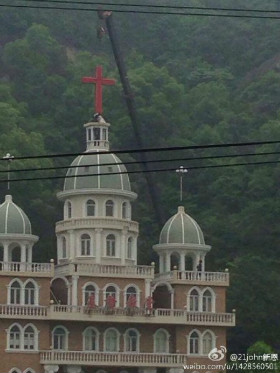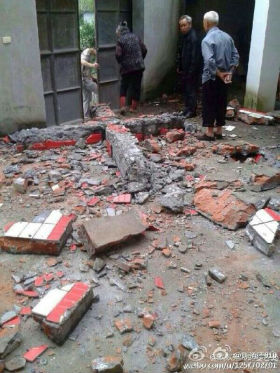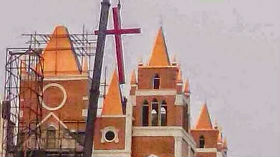When a megachurch's walls came tumbling down in China's Jerusalem last month, the forced demolition drew widespread international attention thanks to photos circulating on Weibo, China's version of Twitter. Now, Weibo photos have documented how local authorities have continued their campaign this May to de-Christianize the skyline of wealthy Wenzhou, one of China's most Christian cities, and surrounding areas.
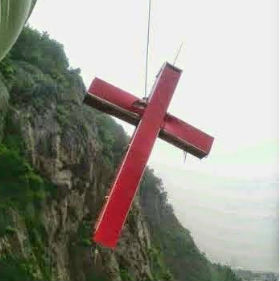 Weibo
WeiboThe latest in the reported "Three Rectifications and One Demolition" campaign comes from the city of Ningbo, where famous missionary James Hudson Taylor once worked. Officials have ordered services to halt at the 1,000-member Xiaying Holy Love megachurch, and demolition work has reportedly already begun after the church refused to tear down the large cross atop its 10-story building.
Meanwhile, The New York Times's Ian Johnson offers a thorough analysis of the much-discussed destruction of Sanjiang Church.
The Telegraph, which has chronicled the plight of Christians and churches in China's southeastern province of Zhejiang this spring, reports that six churches so far have been completely or partially destroyed. Christian Solidarity Worldwide (CSW) lists 18 churches and two hospitals that have been targeted, demolished, or had crosses and religious symbols removed or destroyed. And China Aid documents the number of threatened or destroyed churches—in Zhejiang as well as neighboring Anjui province—at 64, with photos of many of the incidents. President Bob Fu writes at On Faith:
Some say the tension in Zhejiang was prompted by a provincial official's observation during his inspection tour of Wenzhou that too many crosses dominated the cityscape, especially at night.
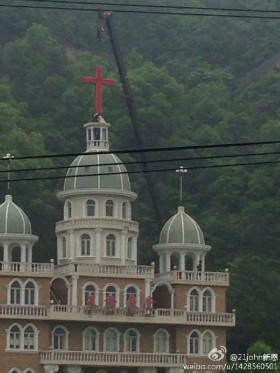 Weibo
WeiboMeanwhile, China Source highlights statements circulating among Chinese Christians exploring the significance attached to the church crosses.
"We do not worship the cross; in fact, we can even build churches without crosses," writes one anonymous author. "This does not mean, however, that we can allow people to remove the crosses from our churches whenever they want. This is brutally trampling our right to believe."
"Christians shouldn't be so sad. Maybe this is a good time to reflect and wonder if we have put too much focus on church buildings," notes another author. "With this jiaotang [church building] now destroyed, we should focus our efforts on building the jiaohui [church, congregation, fellowship]."
This widespread destruction of churches and crosses has caught the attention of leading Chinese scholars, ministers, and lawyers. An impressive group of more than 50 gathered at Purdue University in early May to draft the "Purdue Consensus on Religious Freedom." Concerned by the lack of a "clear definition of and sufficient protection for religious freedom" in China, the consensus (full text below) outlined China's need for more protection of religious rights. Its concluding appeal:
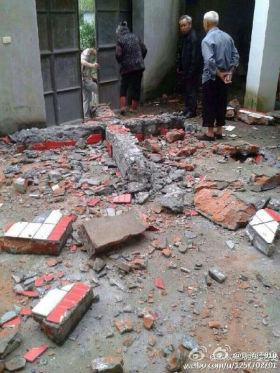 Weibo
WeiboIn legal and public life, all Chinese citizens, irrespective of their religion, denomination, and non-religious system, have the responsibility to respect, to protect, and to fight for the above principles and values of religious freedom.
Chinese officials insist the church demolitions have nothing to do with persecuting Christians. China's Ministry of Foreign Affairs released its first official statement to The Telegraph responding to such accusations on May 20:
I want to emphasise that the Chinese government earnestly protects the rights of Chinese citizens including safeguarding their freedom of religious beliefs. With regard to what has happened in Zhejiang, there has been some misunderstanding. The demolitions took place because those sites were built against relevant regulations. It has nothing to do with religious beliefs.
But that doesn't ring true in cases where only crosses or religious symbols have been targeted for removal, CSW noted in its special analysis of the church destructions in Zhejiang (which previously launched a similar campaign against churches in 2003).
At least one of the churches was an officially approved structure, CSW wrote. "In addition, it is noticeable that in the majority of cases, it is the cross, or another religious symbol, which has been hidden or removed. If the church building itself were unsafe or illegal, the entire structure, and not only the cross, would need to be demolished."
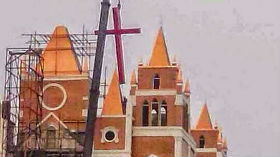 Weibo
WeiboCSW notes:
Wenzhou's Christians are not only numerous, they are also some of the wealthiest and most influential Christians in China. While in some parts of the country, particularly in less developed or politically contested regions, Christians continue to suffer harassment, intrusive monitoring and detention at the hands of the local authorities, in Wenzhou Christians have been regarded as 'good citizens' who contribute to the city's entrepreneurial spirit. Christianity has flourished there, and officials have even turned a blind eye to the construction of large churches. This makes the demolition of churches in and around Wenzhou especially worrying.
CT explored the complex reasons behind the high-profile demolition of Wenzhou's Sanjiang Church.
Christian persecution in China has increased nearly 40 percent since 2012, China Aid recently claimed. Last year, Fu argued the Chinese government was seeking to eradicate house churches. However, China Source and World Watch Monitor disagreed with Fu, arguing that China was not trying to destroy Christianity.
CT regularly reports on China, including recent measures for pastors to curb cult violence and how China relaxed its one-child policy. CT has also interviewed Fu as well as the head of the Three-Self Patriotic Movement.
Here is the full text of the Purdue Consensus on Religious Freedom:
We are deeply concerned about the following reality:
1. China's Constitution and law lack a clear definition of and sufficient protection for religious freedom.
2. Misunderstanding, violation, discrimination and persecution abound with regard to religious freedom in legal and social practices of China.
3. As a result, intellectuals and the general public in China lack an understanding of and a basic consensus on the value and implications of religious freedom.
In accordance with the definition and protection of religious freedom prescribed by a series of international covenants on human rights, we hold the following beliefs:
1. Religious freedom encompasses not only individual freedom of conscience and the freedom to express belief or disbelief in a religion, but also the freedom of family members (adults and children) to adhere to and to express their religious faith, the freedom of parents to instruct their children in their religious faith, the freedom of parents to choose religious education for their children, and the freedom of children to practice their religion and receive the religious education chosen for them by their parents. Religious freedom also encompasses the freedom of religious groups to practice their faith, to worship together, to establish religious venues, to use religious symbols, to publish religious books, and to disseminate religious faith.
2. Religious freedom is a basic and core value of modern nations and societies. Without full protection of religious freedom, other freedoms such as the freedom of speech and the freedom of expression, the freedom of thought, the freedom of academic pursuit, the freedom of family, and the freedom of education that are guaranteed by the Constitution will not be fully protected in reality.
3. Religious freedom implies that religious faiths and non-religious systems, whether in private or in public, are entitled to equality with respect to free expression and legal standing. Neither religious nor non-religious systems shall be deemed negative and discriminated against.
4. Religious freedom implies a constraint on state power, i.e. the state cannot pass judgment on any religious or non-religious system as doctrinally or morally right or wrong, good or bad, let alone penalize citizens on basis of such judgment. Neither can the state make any religious or non-religious system the basis for the state's legitimacy and accord it a preferential legal status.
5. Religious freedom implies that the state has no right or moral authority to distinguish between "legitimate religion" and "feudal superstition," between "orthodox religion" and "heterodox cult," between "orthodoxy" and "heresy." Members of any traditional or emerging religion shall not be subject to government censorship or legal judgment for merely believing, expressing, disseminating, or practicing their religious faith.
To that end, we fervently appeal that:
In legal and public life, all Chinese citizens, irrespective of their religion, denomination, and non-religious system, have the responsibility to respect, to protect, and to fight for the above principles and values of religious freedom.

